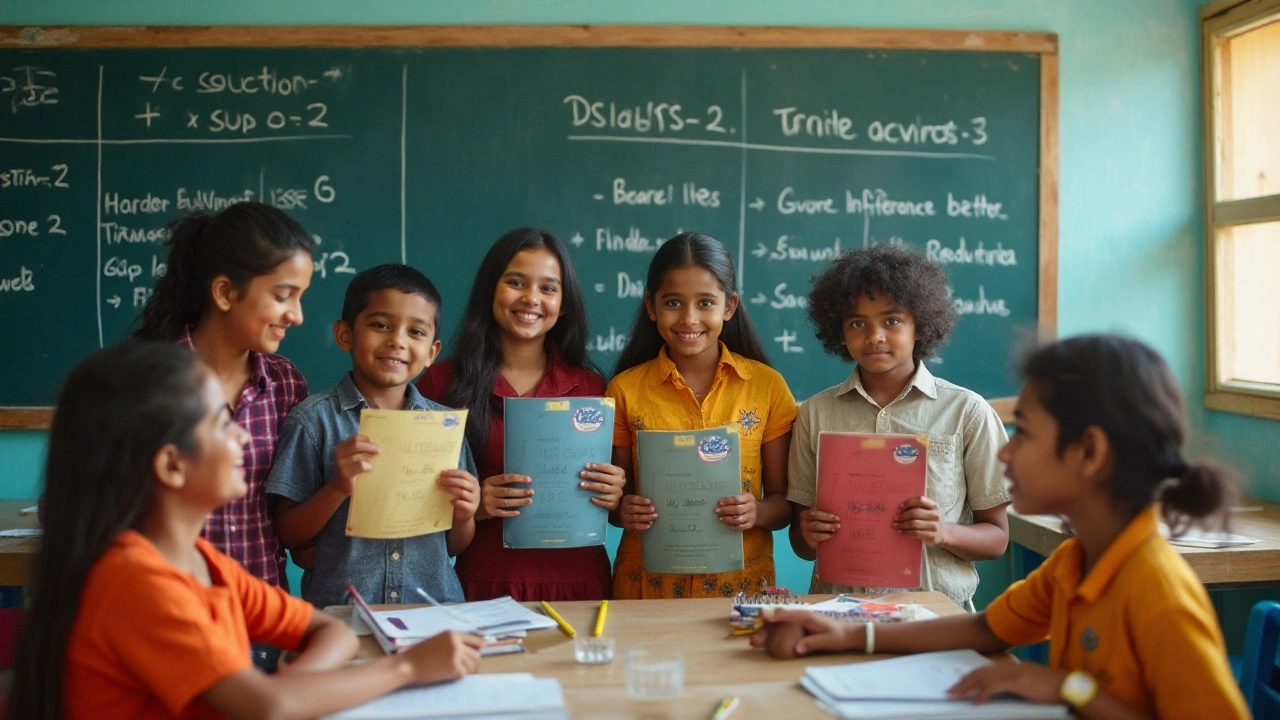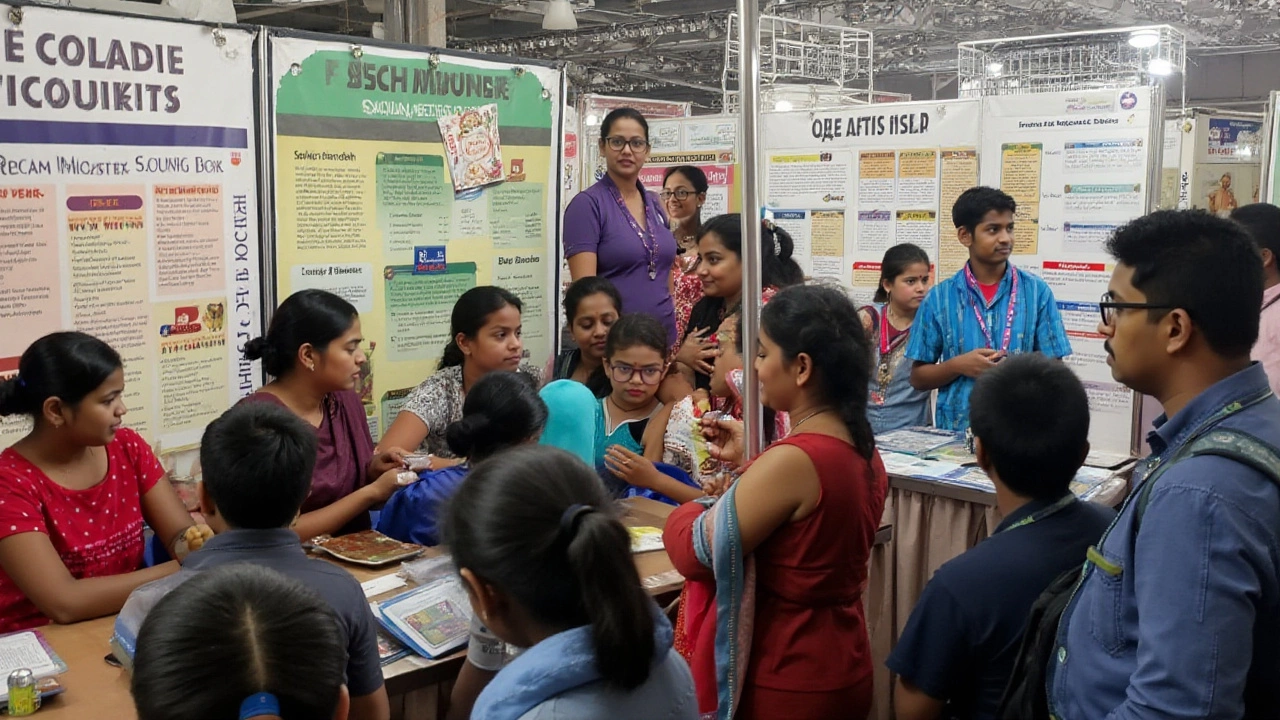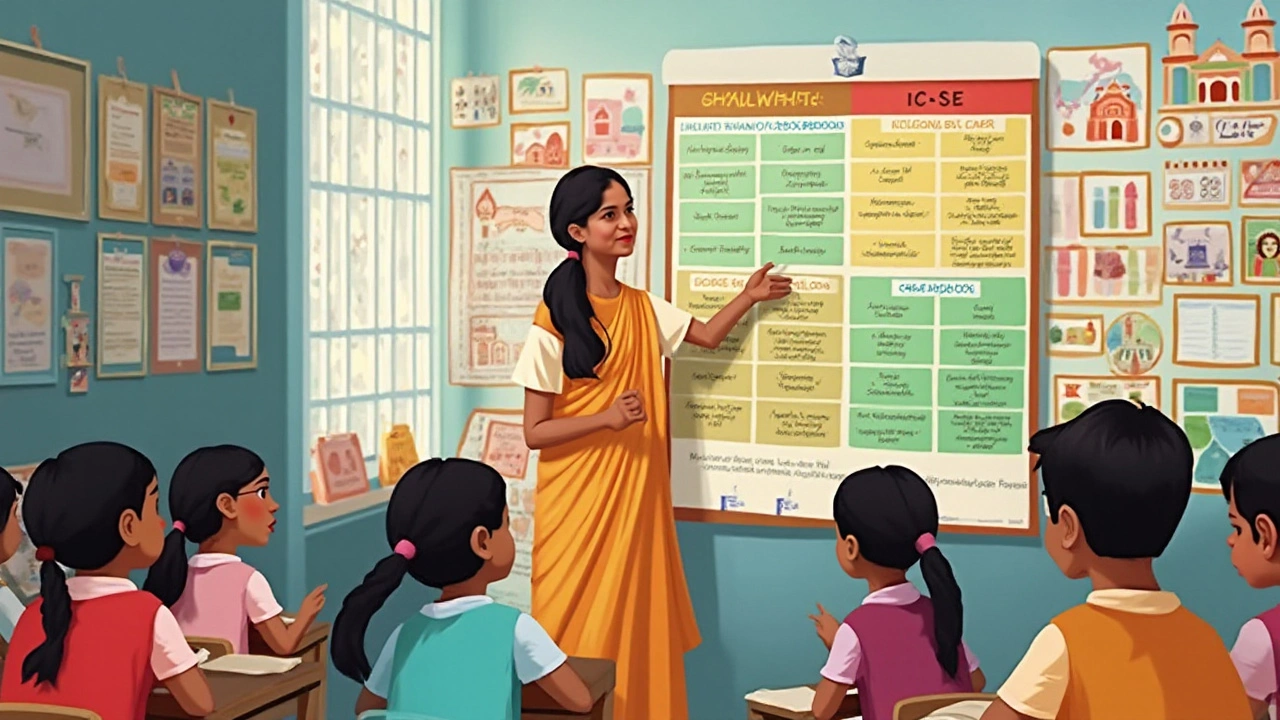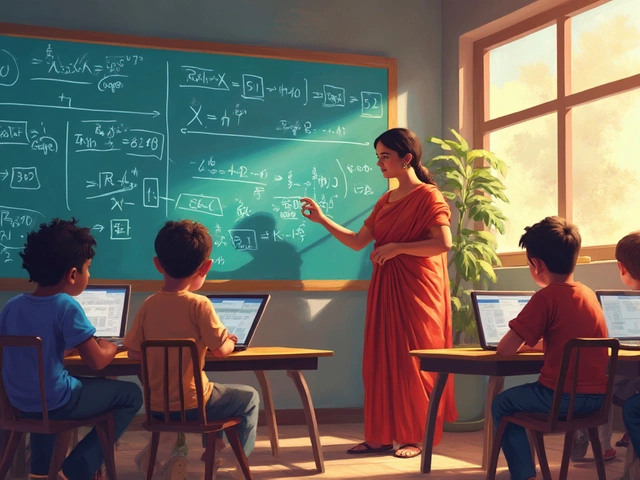
Choosing the Best Educational Board in India: CBSE and Beyond
Navigating the labyrinthine world of Indian education can be challenging, especially when it comes to choosing the right board for your child's education. Each board offers distinct features tailored to different learning needs and ambitions. This guide helps unravel the layers of the Indian educational system, focusing on the Central Board of Secondary Education (CBSE) and its alternatives.
CBSE stands out for its widespread presence and uniform curriculum, often preferred by families with transferable jobs due to its national reach. But is it the best fit for your child's needs? We'll explore the CBSE syllabus's unique aspects and compare it with other prevalent boards like ICSE and state boards. Keep reading to understand which board aligns with your educational goals.
- Understanding the Indian Education System
- The Structure and Features of CBSE
- Comparing CBSE with Other Boards
- Factors to Consider When Choosing a Board
Understanding the Indian Education System
The Indian education system is as diverse as the country itself, characterized by a multitude of educational boards, multilingual academic offerings, and varying grading structures. In essence, it reflects the tapestry of the nation’s cultural and regional diversity. At the heart of this system lies a combination of national, international, state, and private boards, each contributing a unique pedagogical approach. Among these, the CBSE syllabus prevails as one of the most sought-after curricula due to its comprehensive and uniform approach, making it popular among students aspiring for careers in engineering and medical fields.
The system operates on a structured 10+2 pattern, with the first ten years dedicated to general education followed by two years of specialized study in streams like science, commerce, or arts. This structure not only provides a foundational knowledge base but also equips students with critical thinking skills necessary for higher education and professional life. Most state boards administer a similar pattern, though the syllabus content and assessment criteria can differ significantly. For instance, state boards usually incorporate more regional languages and localized content, catering to the specific cultural contexts of those regions. An estimated 60% of Indian students are enrolled in state board schools, highlighting their regional importance and widespread reach.
In contrast, national and international boards often emphasize holistic education and are oriented towards global benchmarks. The CBSE syllabus, for instance, is structured to incorporate a range of subjects, with equal emphasis on both academics and co-curricular activities, fostering well-rounded development. The ICSE and IGCSE boards also promote critical thinking, problem-solving, and analytical skills, similar to international educational standards. This diversity in educational approaches offers parents and students the flexibility to choose a board that aligns with their educational objectives and aspirations.
"Education is the most powerful weapon which you can use to change the world." - Nelson Mandela
While CBSE is popular for its focus on a national framework, state boards offer the benefit of curriculum content that is often more attuned to local culture and history, providing students with a rooted understanding of their culture. As the argument goes, this localized approach to education may foster a strong sense of identity and community among students, a notion particularly appealing to those who wish to maintain deep cultural ties.
Moreover, the choice between a national or state board can be significant when considering higher education opportunities within or outside India. The global recognition of curricula such as the CBSE syllabus, which aligns closely with many entrance examinations for higher education, can offer an advantage for students pursuing studies abroad. On the other hand, a more locally contextualized board can foster strong foundational skills advantageous for civil services and regional academic pursuits.

The Structure and Features of CBSE
As one of the preeminent boards in India, the CBSE syllabus is meticulously structured to provide a balanced education that marries theoretical know-how with practical application. The board operates under the aegis of the Ministry of Education of India, ensuring a curriculum that remains dynamic and responsive to global educational trends. With a focus on science and mathematics, CBSE has been instrumental in preparing students for national level examinations like the Joint Entrance Examination (JEE) and the National Eligibility cum Entrance Test (NEET). The emphasis on continuous and comprehensive evaluation helps reduce examination stress and encourage a deeper understanding of the subjects.
The organizational structure of CBSE involves a tiered management system. At the top is the Chairperson, followed by a series of committees focusing on different domains such as examination, curriculum, and innovation. Unlike many regional boards, the CBSE syllabus features a two-term pattern—Summative Assessment 1 and Summative Assessment 2—each constituting a full academic cycle for evaluation purposes. Additionally, CBSE has made strides in adopting digital modes for examinations, which aligns with their aim to foster a tech-savvy student community. "Digital learning is not just the future, it is the present," remarked an esteemed official from the Ministry of Education.
A particularly notable feature of the CBSE system is its attempt to imbibe cross-curricular pedagogies, integrating subjects like environmental science and life skills within the traditional subjects. This prepares students to face real-world challenges more confidently. Schools affiliated with CBSE often boast state-of-the-art facilities to aid experiential learning, such as science labs, libraries, and audio-visual rooms. Such a setup promotes critical thinking and instils a propensity for inquiry and research, which are crucial traits for aspiring professionals in any field. In addition, data from a Ministry of Education report suggests that nearly 70% of students in CBSE schools express higher satisfaction levels due to reduced academic pressure.
A commitment to inclusivity is another hallmark of CBSE, with policies aimed at providing education to underserved sections of the society. An example of this is the provision of exam concessions for children with special needs, which include extra time, provision of a scribe, and flexibility in assessment methods. In its pursuit to cater to the diverse educational needs of the nation, the board also offers a choice between Hindi and English as mediums of instruction, while elective languages range from Sanskrit to French, giving students a wealth of choices to enhance their linguistic skills.
To stay ahead in a rapidly evolving educational landscape, CBSE is constantly revising its curriculum and including emerging subjects such as artificial intelligence and coding. According to the latest data, there is a 30% increase in schools opting to offer computer-related subjects under CBSE’s aegis, pointing towards an educational ecosystem increasingly inclined towards future-ready skills. Such foresight showcases CBSE's dedication to not only upholding an academic standard but also to equipping students with the tools necessary for tomorrow's challenges. Whether you are a parent weighing options for your child's education or a student gearing up for higher studies, the structuring and unique features of the CBSE board promise a fertile ground for nurturing competence and character.

Comparing CBSE with Other Boards
When considering the landscape of education in India, the choice of board is pivotal, as it influences a student's learning style, thought process, and future prospects. The CBSE syllabus has gained a reputation for its comprehensive nature and national applicability. However, it's not the only contender in the race. Other boards like Indian Certificate of Secondary Education (ICSE) and various state boards bring their unique flavor to education. Each of these boards has crafted its syllabus focusing on diverse educational needs and priorities, making the choice intricate.
CBSE, abbreviated from Central Board of Secondary Education, is widely recognized and appreciated for its structured approach to education. It provides a seamless learning path applicable nationwide and primarily emphasizes Science, Mathematics, and application-based subjects. The uniformity in its curriculum benefits students who move across the country, making transitions smoother relative to other boards. Known for its centered approach to competitive exams, CBSE aligns with entrance exams like JEE and NEET, providing that extra edge to students aiming for careers in engineering or medicine.
According to the National Institute of Educational Planning and Administration, "CBSE's approach fosters a consistent educational framework that aids in national-level competitive assessments."
On the flip side, the ICSE board, administered by the Council for the Indian School Certificate Examinations, exudes a more detailed syllabus with a strong emphasis on English language skills and arts, making it ideal for students leaning towards liberal arts and humanities. With an array of subjects offering depth rather than CBSE's breadth, ICSE shapes scholarly minds through critical thinking and creativity. However, the intensity of its syllabus might seem daunting for some, adding layers of pressure relative to the comparative simplicity seen in the CBSE syllabus. But if harnessed correctly, it cultivates a robust foundation, particularly beneficial when exploring global education opportunities.
State boards are another vital part of the Indian education system, designed around local languages, culture, and history which provides students with a connection to their roots. The variability in syllabus quality and difficulty can be a double-edged sword. While it delivers education in a context familiar to students, it might lack the level of recognition and alignment found in CBSE when viewed from a national perspective. Yet, for those seeking awareness and understanding of local contexts and lifestyles, these boards offer a solid match.
To encapsulate, the selection among CBSE, ICSE, and state boards should be strategically aligned with the student's aspirations and skill set. For students aspiring to fields requiring analytical skills or those frequently moving cities, the CBSE syllabus offers coherence and ease. Those considering global education platforms later in life may benefit from ICSE’s depth and articulation, whereas local state boards might be more suited for students rooted in regional contexts and languages. The decision should be carefully measured against the student's strengths and passion to yield the best educational outcomes.

Factors to Consider When Choosing a Board
Choosing the right educational board is a decision that carries significant weight, impacting a child's academic journey and future opportunities. When evaluating educational boards, several key factors come into play. Parents and students need to understand how the board’s curriculum aligns with their educational and career ambitions. Let's unravel the elements that are crucial in making this choice.
1. Academic Curriculum and Syllabus Design
The academic curriculum is at the heart of every educational board. It dictates the subjects, the depth of content, and the teaching methodologies. The CBSE syllabus is renowned for its structured nature and relevance to competitive exams like the JEE and NEET. It emphasizes core subjects such as Mathematics and Science, which is ideal for students aspiring to pursue engineering or medical careers. In contrast, boards like ICSE offer a broader range of subjects, encouraging a more holistic development of students. Hence, assessing your child's interests and career inclination is vital when selecting a board.
2. Availability and Accessibility of Schools
Another significant consideration is the availability of schools affiliated with the chosen board in your vicinity. For instance, CBSE schools are widespread across India, making it convenient for families who frequently relocate. This availability ensures continuity in education without major disruptions. Conversely, ICSE and state boards may have a localized presence, which might suit families who have established roots in a particular city or region. It's essential to weigh the pros and cons of accessibility as it can affect your child's adaptability and social environment.
3. Recognition and Evaluation System
The recognition of the board plays a pivotal role when it comes to higher education and job opportunities. A board like CBSE is widely recognized on a national level, which can be advantageous for students aspiring to enter central universities or national-level institutes. Additionally, each board’s evaluation system, marking scheme, and examination patterns influence the learning environment. CBSE's emphasis on objective-type questions prepares students for competitive exams, while ICSE focuses on descriptive questioning, nurturing creative thinking. Understanding how your child thrives—under pressure or in creative settings—can guide your choice.
Education expert Rina Sen noted, "Parents should not focus solely on the board. It is more about what the school offers and how it aligns with the child’s needs."
4. Resources and Extracurricular Opportunities
Beyond academics, extracurricular activities are an essential factor. They aid in the overall development of a child, fostering skills such as leadership, teamwork, and time management. Educational boards should provide ample opportunities for students to explore sports, arts, and other interests. The resources a school offers, such as libraries, laboratories, sports facilities, and clubs, play a critical role in this aspect. It's important to evaluate whether the board and the specific school under its affiliation support a balanced upbringing that nurtures both academic prowess and extracurricular talents.
Making an informed choice involves a thorough assessment of these factors. Every board has its distinct strengths, and aligning these with a child's unique needs and aspirations is crucial. A well-considered decision lays down the foundation for a child's successful and fulfilling academic journey.






Write a comment